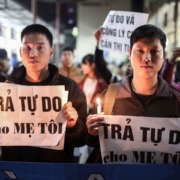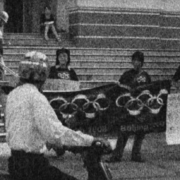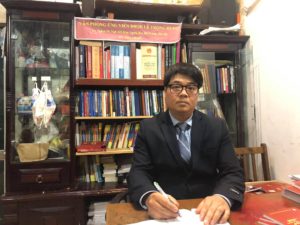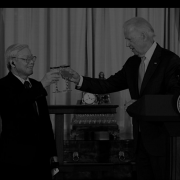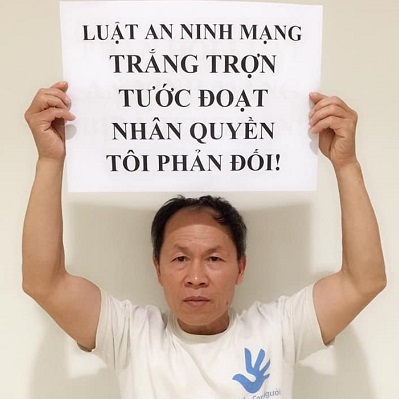Letter to UNOPS re: failure to protect and respond to arbitrary detention of UNOPS advisors in Vietnam
To:
Jorge Moreira da Silva, Undersecretary-General and UNOPS Executive Director
Sanjay Mathur, UNOPS, Director, Asia Region
Philip Timothy Rose,Fund Director, Southeast Asia Energy Transition Partnership
Pauline Tamesis, UN Resident Coordinator for Vietnam
23 November, 2023
Dear Mr. Jorge Moreira da Silva, Mr. Sanjay Mathur, Mr. Philip Timothy Rose, and Ms. Pauline Tamesis,
Re: Failure to protect and respond to arbitrary detention of UNOPS advisors in Vietnam
Project88 is writing to share our concerns regarding the apparent lack of action by the United Nations in response to the arrests of two advisors for the United Nations Office for Project Services (UNOPS) in Vietnam. Moreover, we are concerned that by not recognizing the threat posed to climate activists in the country, the UN Resident Coordinator (RC) for Vietnam did not adequately ensure the safety of UN personnel in the country.
Over the past two years, Vietnam has arrested or imprisoned six key leaders of the country’s climate change movement and forced their organizations and coalitions to cease operating. Nguy Thi Khanh, Dang Dinh Bach, Mai Phan Loi, Bach Hung Duong, and Hoang Thi Minh Hong have been imprisoned on spurious tax evasion charges since 2021.[1] In addition, Vietnamese authorities arrested Ngo Thi To Nhien, the head of an energy policy think-tank, in September 2023 for allegedly misappropriating government documents.[2] Each of these human rights defenders advocated for decarbonizing Vietnam’s energy sector. Two of the arrested activists—Ngo Thi To Nhien and Nguy Thi Khanh—worked directly for UNOPS on Vietnam’s energy transition.
An investigation by Project88 published in April documents clear evidence that these prosecutions are politically driven and designed to criminalize policy activism.[3] The activists’ efforts to organize non-profits into powerful advocacy coalitions and promote a civil society movement brought them into conflict with the Communist Party of Vietnam. The common thread in these cases is that all the individuals involved ran organizations that conducted advocacy on energy policy, and all received foreign funding to carry out this work.
UNOPS’ relationship with the arrested activists
UNOPS, through the Southeast Asia Energy Transition Partnership (ETP), has worked closely with the Vietnamese government to facilitate the country’s transition from fossil fuels to renewable energy sources.[4]The ETP was formed to accelerate energy transitions in Indonesia, Vietnam, and the Philippines.[5] UNOPS hosts the ETP Secretariat and provides financial management, procurement and human resource services to the ETP.[6] In Vietnam, the ETP has worked to accelerate Vietnam’s energy transition by conducting research and advocacy.[7] To undertake this work, UNOPS relies on Vietnamese consultants and advisors. Prior to their arrests, Ngo Thi To Nhien and Nguy Thi Khanh were hired by UNOPS to serve as advisors. Together, Nhien and Khanh represented half of the ETP’s Vietnam advisory team.
Nhien worked as a consultant for the ETP, and, in that role, worked closely with the Vietnamese government on the country’s energy transition.[8] In 2021, UNOPS hired her to conduct what then ETP Fund Director Sirpa Jarvenpaa described as ‘a very sensitive undertaking to assess the coal abatement options.’[9] The ‘sensitive undertaking’ was a research study that attempted to determine the potential reduction of carbon emitted by Vietnam if the country stopped using coal-fired power.[10] The study also explored strategies that could realize this coal-free future. In the study report, Nhien proposed that advocacy should be conducted with senior state and party leaders to persuade them to commit to a policy of ‘no new coal power plants.’[11]
The research, which cost over $200,000, was perceived by some as too bold. Commenting on the study, John Cotton, Senior Program Manager of the ETP, said:
…we were advised that it was too ambitious, but ETP’s technical agents were able to leverage on the RRF’s [Rapid Response Facility] political network, deliver this paper…and we believe…that it led to the announcement by Vietnam last year at COP26 […of] their Net Zero pathway.[12]
While the study appears to have played a contributing role in Vietnam’s decision to commit to a policy of Net Zero, the cautionary advice provided to John Cotton appears to have been well founded. In July 2021, three climate activists who were campaigning for the government to reduce its reliance on coal in a draft energy policy that was under consideration, were arrested. One month after Vietnam’s Net Zero announcement at COP26, in January 2022, Nguy Thi Khanh, founder of the Green Innovation and Development Centre and the Vietnam Sustainable Energy Alliance, was arrested.[13] Khanh, like Nhien, was an advisor to the ETP prior to her arrest.
Undeterred by these arrests, including the arrest of their own advisor, UNOPS contracted Nhien again in 2022. This time UNOPS hired her to lead a contentious institutional reform project that aimed to decarbonize Vietnam’s energy sector, a sector that is dominated by three state-owned monopolies that are deeply invested in coal.[14]
In recent years, the Vietnamese government has made numerous statements expressing concern that foreign donors are funding civil society to interfere in Vietnam’s internal affairs, including the country’s energy transition.[15] Each of the arrested climate activists received foreign funding and advocated for changes to the government’s energy policy—advocacy that may have been viewed by the government as an effort to interfere in its internal affairs.
In spite of these risks, UNOPS continued to hire Vietnamese nationals to carry out precisely these activities. The risks of these projects were clear, but UNOPS forged ahead nonetheless. As of November 2023, UNOPS and the UN Resident Coordinator have remained silent about the arrests of Ngo Thi To Nhien and Nguy Thi Khanh.
Non-compliance with UNOPS and UN standards
In its operations in Vietnam, it appears that UNOPS has not complied with UNOPS or UN standards regarding risk management. Likewise, the UN Resident Coordinator (RC) seemingly did not fulfill her obligation to ensure the safety of UN personnel in the country. Finally, by working with the Vietnamese government on its energy transition while not challenging the government’s attacks on civil society, UNOPS has not successfully worked to uphold human rights in Vietnam.
UNOPS risk management obligations
UNOPS had an obligation to protect the security of Ngo Thi To Nhien and Nguy Thi Khanh and to not take any action that would put them at undue risk. Paragraph 41 of the Standards of Conduct for the International Civil Service states that ‘it is the responsibility of organizations [including UNOPS] to ensure that the health, well-being, security, and lives of their staff, without any discrimination whatsoever, will not be subject to undue risk.’[16] UNOPS clarifies that this responsibility applies to all UNOPS personnel, partners, contractors, and ‘any other parties affected by or participating in UNOPS activities.’[17] Nhien and Khanh, as advisors for the ETP, would be part of this group.
UNOPS purports to take a risk-based approach—that is, ‘safety risk-mitigation is embedded in all activities and that planning, resource allocation, supervision and performance monitoring are adequate . . . .’[18] UNOPS projects must proactively identify and manage risks, and must by mindful of lessons learned related to risk throughout the project’s lifespan.[19] In addition, under the UNOPS operational directive on Risk Management, all relevant stakeholders must be consulted throughout the risk management process about the current level of risk and to determine whether the risk is acceptable.[20]
By ignoring the cautionary words expressed to John Cotton regarding the ETP’s study, and especially by hiring Nhien as a consultant in 2022 after the arrest of Khanh and other climate activists, UNOPS may not have met its obligations. In spite of the risks to climate activists that should have been obvious by 2022, UNOPS still chose to move forward with their contentious and potentially risky project. Nhien was arrested the next year, while still working for the ETP.
In the UNOPS guidance on Safety and Security Management, the arrest or detention of personnel is given as an example of a safety or security incident that, due to its severity, would require an immediate report to be made.[21] In addition, under the United Nations Security Management System (UNSMS) Security Policy Manual, the Chief of Security in Vietnam would have a duty to not only report the arrests of Nhien and Khanh, but also to ‘determine what further action may be required, including, as appropriate, the involvement of the Secretary-General and the Office of Legal Affairs.’[22] Under UNOPS policy, the Chief of Security in a particular country, who would be responsible for taking these steps, is the most senior UNOPS personnel in that country.[23] It is unclear if these procedures were followed after the arrests of Khanh and Nhien.
It is also unclear who the most senior member of the ETP is at the moment. It appears that, around the time of the arrest of Ngo Thi To Nhien, the ETP Fund Director, Sirpa Jarvenpaa, left the organization abruptly. When Philip Timothy Rose became the new ETP Fund Director, the organization issued no press statement or explanation for Jarvenpaa’s departure.
Failure of the UN Resident Coordinator
The UN Resident Coordinator (RC) is ultimately responsible for ensuring the safety of UN work in Vietnam. By failing to ensure the safety of Ngo Thi To Nhien and Nguy Thi Khanh, it is possible that the RC and the UN Country Team did not fulfill its obligations.
In countries where there is the risk of violations of human rights, the RC ‘coordinates the UN Country Team in developing and implementing a strategy to address such risks or violations. . .’[24] It is the obligation of the RC to monitor signs of human rights violations ‘that might serve as early indicators of a deteriorating situation’.[25] For their part, UN Country Team members are required to ‘support the RC in developing and implementing a strategy to address [human rights] risks or violations.’[26]
The Resident Coordinator seemingly did not adequately address the risk posed by the arrests of climate activists in Vietnam to advisors working for UNOPS. As such, the RC appears to have shirked their responsibility to take measures to protect Ngo Thi To Nhien and Nguy Thi Khanh.
Upholding human rights in Vietnam
Finally, UNOPS has an obligation to further the values of the United Nations in all its projects. By failing to ensure that Vietnam meets its human rights responsibilities with regards to the country’s energy transition, UNOPS has not fulfilled this obligation.
According to the UNOPS due diligence framework, ‘UNOPS must ensure that the external entities it engages and contracts with are aligned with the overarching principles and core values of the UN Charter, the 2030 Sustainable Development Agenda, the Ten Principles of the UN Global Compact, as well as the UN Guiding Principles on Business and Human Rights and the Guidelines on a principle-based approach to the Cooperation between the UN and the business sector.’[27] That is, UNOPS will ‘only enter into agreements that comply with and further the United Nations values, principles and goals.’[28]
UNOPS has entered into agreements with the Vietnamese government to assist the country’s energy transition. However, in implementing this decision, Vietnam has consistently taken actions at odds with international human rights standards. UNOPS should have been aware of these actions and not entered into agreements that risked compromising UN values, principles, and goals.
The approach of UNOPS to sustainable development prioritizes ‘upholding the United Nations commitment to . . . human rights policies’ and ensuring the ‘respect for human rights and rights-based approaches’ in the implementation of sustainable development in countries it works in.[29] In part, this is essential to the mission of UNOPS because societies are more resilient when they uphold human rights and the rule of law.[30] As UNOPS stated in its most recent Strategic Plan, ‘In December 2023, the declaration of Human Rights will be 75 years old, a stark reminder of our responsibility to promote and protect human rights and fundamental freedoms for all.’[31]
By arresting climate activists on spurious charges and forcing environmental organizations to shut down, the Vietnamese government has violated key civil and political rights, including the rights to liberty and security of person and the right to a fair trial, as well as the rights to freedom of expression and association. By continuing to work with Vietnam on their climate transition without protesting its violations of international law, UNOPS is failing to promote and protect human rights in Vietnam.
Moreover, by remaining silent about violations of the rights of its own advisors, UNOPS is failing in its duty to ensure that Vietnam upholds its human rights commitments with regards to the country’s energy transition. Given the current situation in Vietnam, including ongoing threats to climate activists and restrictions on the ability of civil society organizations to access information and participate in public affairs, it is difficult to see how UNOPS’ preparatory assistance for Vietnam’s energy transition complies with the organization’s obligations.
UNOPS must live up to the words in its Strategic Plan:
We . . . need to make it easier to say no, if asked to do things that we do not find commensurate with United Nations norms and standards, the imperatives of the Charter or the Declaration of Human Rights.[32]
Ensuring a ‘just’ transition
Vietnam cannot ensure a just energy transition if the government does not allow climate activists and other members of Vietnamese civil society, particularly those who are critical of current governmental policies, to participate in the implementation of the transition.[33] A robust civil society is necessary to address climate change and ensure that Vietnam’s energy transition protects the environment, the rights of workers, and members of marginalized communities. As explained by the Intergovernmental Panel on Climate Change, ‘civil society is to a great extent the only reliable motor for driving institutions to change at the pace required.’[34] Vietnam’s crackdown on civil society puts into jeopardy whether the country’s energy transition will be ‘just’ or successfully implemented.
We urge UNOPS and the UN Resident Coordinator to take the following actions:
- Provide an explanation for why UNOPS continued to engage Ngo Thi To Nhien in work that representatives of the organization have characterized as ‘sensitive’ and ‘too ambitious’ after another UNOPS advisor had already been arrested.
- Make a statement condemning the arbitrary arrests of UNOPS advisors Ngo Thi To Nhien and Nguy Thi Khanh, while demanding Vietnam commit to no further arrests of environmental activists.
- Provide a full account of what measures were taken to comply with UNOPS risk mitigation requirements to attempt to reduce the risk of arrest to Nguy Thi Khanh and Ngo Thi To Nhien after the arrests of three climate activists working on energy policy in June 2021.
- Provide a full account of what measures were taken to comply with UNOPS and UNSMS obligations to report the arrests of Nguy Thi Khanh and Ngo Thi To Nhien and the results of the deliberations made at the time concerning what level of support to provide the two after their arrests.
- Conduct rigorous due diligence in accordance with UNOPS policies on the current threats to environmental and human rights defenders and the operation of civil society organizations with regards to Vietnam’s energy transition.
- Demand the Vietnamese government immediately and unconditionally release Dang Dinh Bach, Hoang Thi Minh Hong, and other environmental human rights defenders from prison.
- Ensure that civil society is able to safely participate and play a substantive role in any ongoing or future ETP activities in Vietnam.
- Ensure that UNOPS only enters into agreements that promote human rights, further the safety of human rights defenders, and, in general, comply with the United Nations values, principles, and goals.UNOPS’ ETP program is organizing a series of events at COP28. This seems to be an appropriate forum for representatives of UNOPS to publicly respond to the recommendations above.
Thank you for your consideration and we look forward to your response. Please direct communications to Ben Swanton, Co-director of Project88, [email protected]. We would be happy to participate in a meeting to discuss these issues further. Please direct communications to Ben Swanton
Sincerely,
Project88
[1] Swanton, Ben (2023). Weaponizing the law to prosecute the Vietnam Four. Project88. https://the88project.org/wp-content/uploads/2023/04/Weaponizing-the-law-report-Project-88-ENG.pdf
[2] Tổng Thuật: Họp báo Chính phủ thường kỳ tháng 9/2023 (2023, Sep. 30). Báo Chính Phủ. Retrieved Nov. 20, 2023, from https://baochinhphu.vn/cap-nhat-hop-bao-chinh-phu-thuong-ky-thang-9-2023-102230930112617639.htm
[3] Swanton, Ben (2023). Weaponizing the law to prosecute the Vietnam Four. Project88. https://the88project.org/wp-content/uploads/2023/04/Weaponizing-the-law-report-Project-88-ENG.pdf
[4] UN Vietnam (2023, June 14). Supporting Viet Nam’s energy transition ambitions. Retrieved Nov. 20, 2023, from https://vietnam.un.org/en/236315-supporting-viet-nam%E2%80%99s-energy-transition-ambitions
[5] About ETP. Energy Transition Partnership. Retrieved Nov. 20, 2023, from https://www.energytransitionpartnership.org/about-etp/action/
Energy Transition Partnership (2023, March). 2022 Annual Report. Retrieved Nov. 20, 2023, from https://www.energytransitionpartnership.org/uploads/2023/03/2022-ETP-Annual-Report-Final-1.pdf
Ngo, Thi To Nhien et al., (2022, April 15). Review and gap analysis of the existing abatement scenarios for Vietnam. Just Transition For All, p. 13. Retrieved Nov. 20, 2023, from https://justtransitionforall.com/wp-content/uploads/2022/10/Review-and-Gap-Analysis-of-the-Existing-Abatement-Scenarios-for-Vietnam-2.pdf
[6] ETP Work. Energy Transition Partnership. Retrieved Nov. 20, 2023, from https://www.energytransitionpartnership.org/etp-work/
[7] Vietnam. Energy Transition Partnership. Retrieved Nov. 20, 2023, from https://www.energytransitionpartnership.org/country/vietnam/
[8] See NH Quang & VNEEC (March 2022). JETP experience in South Africa and Indonesia, and lessons learnt for Vietnam. ETP. Retrieved Nov. 20, 2023, from https://www.energytransitionpartnership.org/uploads/2023/05/Report-Analysis-of-JETP-experience-in-Indonesia-and-South-Africa.pdf
NH Quang & VNEEC (April 2023). Policy Brief for Preparation of Just Energy Transition Partnership Implementation in Viet Nam – Legal Aspects. ETP. Retrieved Nov. 20, 2023, from https://www.energytransitionpartnership.org/uploads/2023/05/Policy-brief-on-Review-of-the-background-and-legal-concerns-for-JETP-development-and-implementation-in-Vietnam.pdf
[9] Finance in Common Summit (2022, Oct. 22). Youtube. Retrieved Nov. 20, 2023, from https://www.youtube.com/watch?v=OLEVtp8SEfA&ab_channel=FinanceinCommonSummit
[10] Ngo, Thi To Nhien et al., (2022, April 15). Review and gap analysis of the existing abatement scenarios for Vietnam. Just Transition For All, p. 13. Retrieved Nov. 20, 2023, from https://justtransitionforall.com/wp-content/uploads/2022/10/Review-and-Gap-Analysis-of-the-Existing-Abatement-Scenarios-for-Vietnam-2.pdf
[11] Ibid.
[12] Climate Compatible Growth (2022, Nov. 9). The Energy Transition Council’s Rapid Response Facility (RRF)(video). The United Nations Framework Convention on Climate Change. Retrieved Nov. 20, 2023, from https://www.energytransitionpartnership.org/event/etp-atcop27/
[13] Swanton, Ben (2023). Weaponizing the law to prosecute the Vietnam Four. Project88. https://the88project.org/wp-content/uploads/2023/04/Weaponizing-the-law-report-Project-88-ENG.pdf
[14] VIETSE, Economica, NHQuang&Associates, Carbon Trust. Roadmap for the Commission for Management of State Capital toward Net-Zero Emission in Energy State-Owned Enterprises: South-east Asia Energy Transition Partnership. Retrieved Nov. 20, 2023, fromhttp://gizenergy.org.vn/media/app/media/Ngay 2_phien 3_Bai 4_EN.pdf
The terms of reference for Nhien’s position in this project states that ‘The TA [technical advisor] will require the services of an experienced consultant with deep international experience and knowledge of energy sector SOE financial and governance, change management, asset management and disengagement processes, combined with a strong background in Vietnam’s energy sector development, opportunities and challenges to accelerate energy transition. The consultant is expected to be able to expose CMSC [Commission for Management of State Capital] and its energy sector SOEs to international experience in divestment from GHG emitting energy production assets and point to experience for expanding international and national finance for the energy sector to reduce physical infrastructure and energy production impediments and enable acceleration toward energy transition.’
RFP roadmap for the commission for management of state capital toward net-zero emission in energy state-owned enterprises in Viet Nam (2022, April 21). United Nations Global Marketplace. Retrieved Nov. 20, 2023, from https://www.ungm.org/Public/Notice/172862
[15] Nguyễn, Phú Trọng (2016, Oct. 30). Nghị Quyết Hội Nghị Lần Thứ Tư Ban Chấp Hành Trung Ương Đảng Khoá XII Về Tăng Cường Xây Dựng, Chỉnh Đốn Đảng; Ngăn Chặn, Đẩy Lùi Sự Suy Thoái Về Tư Tưởng Chính Trị, Đạo Đức, Lối Sống, Những Biểu Hiện “Tự Diễn Biến”, “Tự Chuyển Hóa” Trong Nội Bộ”, № 04- NQ/TW. Thư Viện Pháp Luật. Retrieved Nov. 20, 2023, from https://thuvienphapluat.vn/van-ban/Bo-may-hanh-chinh/Nghi-quyet-04-NQ-TW-xay- dung-Dang-ngan-chan-suy-thoai-tu-tuong-chinh-tri-dao-duc-loi-song-2016-332531.aspx
Trần, Đắc Lợi (2017, Jan. 16). Hướng Dẫn Quán Triệt Và Triển Khai Thực Hiện Ý Kiến Chỉ Đạo Của Ban Bí Thư Về Sơ Kết 5 Năm Và Tiếp Tục Thực Hiện Chỉ Thị Số 04-CT/TW Ngày 06/7/2011 Của Ban Bí Thư Khóa XI ‘Về Tiếp Tục Đổi Mới Và Nâng Cao Hiệu Quả Công Tác Đối Ngoại Nhân Dân Trong Tình Hình Mới, № 02-HD/BĐNTW. Thư Viện Pháp Luật. Retrieved Nov. 20, 2023, from https://thuvienphapluat.vn/van-ban/Bo-may-hanh-chinh/Huong-dan- 02-HD-BDNTW-2017-doi-moi-va-nang-cao-hieu-qua-cong-tac-doi-ngoai-nhan-dan-364089.aspx
Quang Minh (2023, September 15). Không được phép can thiệp, xâm phạm quyền, lợi ích hợp pháp của đất nước và nhân dân Việt Nam. Báo Nhân Dân điện tử. Retrieved Nov. 20, 2023, from https://nhandan.vn/khong-duoc-phep-can-thiep-xam-pham-quyen-loi-ich-hop-phap-cua-dat-nuoc-va-nhan-dan-viet-nam-post772574.html
[16] International Civil Service Commission (2013). Standards of Conduct for the International Civil Service. Retrieved Nov. 20, 2023, from https://icsc.un.org/Resources/General/Publications/standardsE.pdf; UNOPS (2023 Sept. 28). Operational Instruction Ref. OI.PCG.2023.01. Personnel Management Framework. Retrieved Nov. 20, 2023, from https://content.unops.org/documents/libraries/policies-2020/operational-directives-and-instructions/human-resources-ethics-and-culture/en/OI.PCG.2023.01-Personnel-Management-Framework.pdf
[17] UNOPS (2021, Nov. 10). Executive Office Directive Ref. EOD.ED.2021.01. Occupational Health & Safety and Social & Environmental Management. Retrieved Nov. 20, 2023, from https://content.unops.org/documents/libraries/policies-2020/executive-office-directives-and-instructions/health-safety-and-social-environment-management/en/EOD.ED-HSSE-Management.pdf
[18] Ibid.
[19] UNOPS (2022, Sept. 13). Operational Instruction Ref. OI.IPS.2022.04. Project Management. Retrieved Nov. 20, 2023, from https://content.unops.org/documents/libraries/policies-2020/operational-directives-and-instructions/management-of-unops-partners-and-resulting-agreements/en/OI.IPMG-Project-Management.pdf
[20] UNOPS (2018, March 15). Operational Directive Ref. OD.FG.2018.03. Risk Management. Retrieved Nov. 20, 2023, from https://content.unops.org/documents/libraries/policies-2020/operational-directives-and-instructions/risk-management/en/OD.FG-Risk-Management.pdf
[21] UNOPS (2018, Feb. 22). Operational Instruction Ref. OI.SECURITY.2018.01. Safety and Security Management. Retrieved Nov. 20, 2023, from https://content.unops.org/documents/libraries/policies-2020/operational-directives-and-instructions/safety-and-security/en/OI.Security-Safety-and-Security-Management.pdf
[22] United Nations Security Management System. Security Policy Manual, page 154. Retrieved Nov. 20, 2023, from https://www.un.org/en/pdfs/undss-unsms_policy_ebook.pdf
[23] UNOPS (2018, Feb. 22). Operational Instruction Ref. OI.SECURITY.2018.01. Safety and Security Management. Retrieved Nov. 20, 2023, from https://content.unops.org/documents/libraries/policies-2020/operational-directives-and-instructions/safety-and-security/en/OI.Security-Safety-and-Security-Management.pdf
[24] UNDG. Guidance Note on Human Rights for Resident Coordinators & UN Country Teams at page 10. Retrieved Nov. 20, 2023, from https://unsdg.un.org/sites/default/files/UNDG-Guidance-Note-on-Human-Rights-for-RCs-and-UNCTs-final.pdf
[25] Ibid.
[26] Id., page 13.
[27] UNOPS (2023, April 16). Operational Directive Ref. OD.QAG.2023.01. Due Diligence Framework at UNOPS. Retrieved Nov. 20, 2023, from https://content.unops.org/documents/libraries/policies-2020/operational-directives-and-instructions/quality-assurance-compliance-and-due-diligence/en/OD.QAG-Due-Diligence.pdf
[28] Ibid.
UNOPS (2017, Oct. 13). Operational Directive Ref. OD.EO.2017.02. Management of UNOPS Partners and Resulting Agreements. Retrieved Nov. 20, 2023, from https://content.unops.org/documents/libraries/policies-2020/operational-directives-and-instructions/management-of-unops-partners-and-resulting-agreements/en/OD.EO-Management-of-UNOPS-Partners.pdf
[29] UNOPS (2017, July 13). Operational Directive Ref. OD.PCG.2017.01. Human Resources, Ethics and Culture, paras. 11 & 16. Retrieved Nov. 20, 2023, from https://content.unops.org/documents/libraries/policies-2020/operational-directives-and-instructions/human-resources-ethics-and-culture/en/OD.PCG-HR-Ethics-Culture.pdf
[30] Id., para. 25.
[31] Executive Board of the UNDP, UNPF, and the UNOPS (2023, April 26). The UNOPS strategic plan, 2022-2025, restated. UN Doc. DP/OPS/2023/6, para. 14. Retrieved Nov. 20, 2023, from https://content.unops.org/documents/libraries/executive-board/documents-for-sessions/2023/annual-session/item-15-united-nations-office-for-project-services/en/DP-OPS-2023-6_EN.pdf
[32] Id., para. 84.
[33] Robertson, Phil (2023, Sept. 9). Biden Should Press Climate Activist Rights in Vietnam. Asia Times. Retrieved Nov. 20, 2023, from https://asiatimes.com/2023/09/biden-should-press-climate-activist-rights-in-vietnam/
[34] UNGA (July 23, 2021). Exercise of the rights to freedom of peaceful assembly and of association as essential to advancing climate justice. UN Doc. A/76/222, para. 9. Re: Failure to protect and respond to arbitrary detention of UNOPS advisors in Vietnam
© 2023 The 88 Project


